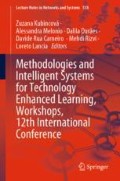Abstract
This is an ongoing study describing the activities undertaken as part of the research project EmpAI: Empowerment of AI competencies. The goal is to test the effectiveness of a school-based training program to promote AI learning skills. Because it is important to establish evidence-based practices, as part of the project we identified four basic abilities that we hypothesize are functional for understanding some mechanisms underlying AI, and we designed an experiment to test the effectiveness of the training in promoting children’s learning of such mechanisms. For each basic ability, we designed a game-based activity to be implemented in fifth and sixth grades in Italy. In this paper, we focus on the experience of implementing the activities in these classes. In particular, we collected a series of observations in the implementation of the activities, being particularly interested in the difficulties of the students and the differences in performance between the two grades. In particular, we observed different levels of participation and approach between the two grade levels in some activities. We will incorporate these observations into the follow-up project Impar.IA.mo, whose goal is to train teachers to replicate these activities in the regular school day.
Access this chapter
Tax calculation will be finalised at checkout
Purchases are for personal use only
References
Baldoni, M., et al.: Empowering AI competences in children: a training program based on simple playful activities. In: PSYCHOBIT (2021)
Bell, T., Vahrenhold, J.: CS unplugged—how is it used, and does it work? In: Böckenhauer, H.-J., Komm, D., Unger, W. (eds.) Adventures Between Lower Bounds and Higher Altitudes. LNCS, vol. 11011, pp. 497–521. Springer, Cham (2018). https://doi.org/10.1007/978-3-319-98355-4_29
Deterding, S., Dixon, D., Khaled, R., Nacke, L.: From game design elements to gamefulness: defining gamification. In: International Academic MindTrek Conference: Envisioning Future Media Environments (2011)
Miller, G.A., Galanter, E., Pribram, K.H.: Plans and the structure of behavior. In: Paperback (1960)
Nardelli, E., Ventre, G.: Introducing computational thinking in Italian schools: a first report on “programma il futuro” project. In: INTED (2015)
Searle, J.: Minds, brains and programs. Behav. Brain Sci. 3, 417–424 (1980)
Vrugt, A., Oort, F.: Metacognition, achievement goals, study strategies and academic achievement: pathways to achievement. Metacogn. Learn. 3, 123–146 (2018). https://doi.org/10.1007/s11409-008-9022-4
Yang, W.: Artificial intelligence education for young children: why, what, and how in curriculum design and implementation. Comput. Educ. Artif. Intell. 3, 100061 (2022)
Acknowledgements
Work supported by the project EmpAI and Impar.IA.mo, financed by the Compagnia di San Paolo and by the University of Torino. The authors would like to thank all team members of the two projects.
Author information
Authors and Affiliations
Corresponding author
Editor information
Editors and Affiliations
Rights and permissions
Copyright information
© 2023 The Author(s), under exclusive license to Springer Nature Switzerland AG
About this paper
Cite this paper
Baldoni, M. et al. (2023). Empowering AI Competences in Children: The First Turning Point. In: Kubincová, Z., Melonio, A., Durães, D., Rua Carneiro, D., Rizvi, M., Lancia, L. (eds) Methodologies and Intelligent Systems for Technology Enhanced Learning, Workshops, 12th International Conference. MIS4TEL 2022. Lecture Notes in Networks and Systems, vol 538. Springer, Cham. https://doi.org/10.1007/978-3-031-20257-5_18
Download citation
DOI: https://doi.org/10.1007/978-3-031-20257-5_18
Published:
Publisher Name: Springer, Cham
Print ISBN: 978-3-031-20256-8
Online ISBN: 978-3-031-20257-5
eBook Packages: Intelligent Technologies and RoboticsIntelligent Technologies and Robotics (R0)

